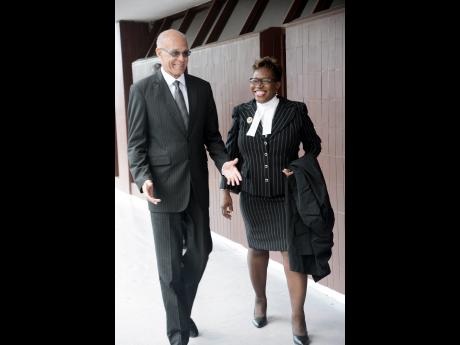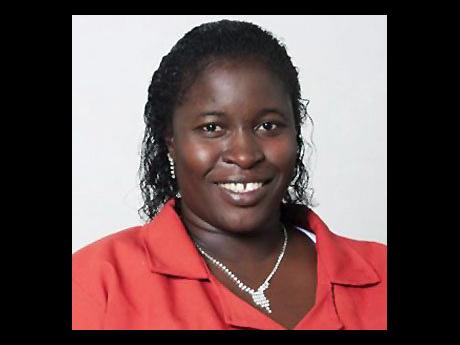Director of public profiling?
An updated version of this column was sent Friday, June 26 but an older version was published earlier today. Here is the correct version:
Apparently, unless one has “significant prosecutorial experience”, one is disqualified from offering a valid opinion on the criminal law.
This is the absurd premise of DPP Paula Llewellyn’s illogical response ('A lesson in Law for Gordon Robinson',Gleaner, May 22, 2015 ) to my critique of her press release on the Shernet Haughton case ('If DPP could only understand herself', Sunday Gleaner, May 17, 2015) setting herself up as sole arbiter of the criminal law, she wrote: “The public deserves to read the entire release of April 23, 2015 rather than the subjective interpretation of pieces of it by Mr Robinson, who, though he may have attained a certain level of distinction as a civil-law practitioner, to my certain knowledge, is not possessed of any significant prosecutorial experience.”
Lord, deliver us. Persons of significant prosecutorial and other legal experience have commented to me on the shallowness of her response. One criminal-defence lawyer wondered aloud at her reluctance to proceed because of absence of evidence when she proceeded to full trial in a celebrated rape case while in possession of DNA evidence exculpating the defendants. I suppose puss and dawg rarely have the same luck.
Another lawyer of considerable all-round experience commented as follows by email: “Humbug. I stopped reading it at the point where she said you had no prosecutorial experience. At that point, it lost academic merit, for me.”
So, let’s be clear. Prosecutorial experience isn’t a prerequisite for reading, understanding or interpreting any law. The evidence so far suggests it might be a hindrance. Attacking “prosecutorial experience” in responding to critique heralds a weak substantive defence.
The DPP set about erecting and destroying her own straw men. She wrote: “... Mr Robinson seemed unable to make a clear distinction between the dictionary definition of corruption and its legal definition as an offence with ingredients.” Oh, dear. This is sad. In fact, my column quoted the legal definition of an “act of corruption” not from the dictionary but from the Corruption Prevention Act, Section 14 as follows:
“A public servant commits an act of corruption if he ... -
(b) in the performance of his public functions does any act or omits to do any act for the purpose of obtaining any illicit benefit for himself or any other person.”
I DID NOT go to the dictionary for the definition of 'corruption'. I quoted the dictionary definition of 'illicit' (an English word used in an “ingredient” of the offence). 'Illicit' means "not approved of by the normal rules of society".
So, prosecutorial experience or not, the simple issue is, was there an indictable case that Ms Haughton had done anything “for the purpose of obtaining any illicit benefit for [herself] or any other person”? The DPP herself described Ms Haughton’s actions as “egregious nepotism”. Which societal norm allows public officials to use “egregious nepotism” for their families’ benefit?
It gets worse. The DPP writes: “... His comments suggest the DPP should have relied on speculation in the absence of any evidence of Ms Haughton receiving any benefit from her recommendation of awards of contracts to her relatives (after all, that evidence would have to come from statements given by her relatives ...).”
Jeez, Louise! Has DPP read the statute? It matters not if Ms Haughton received any personal benefit and there’s NO REQUIREMENT TO PROVE THIS. 'Benefit' can be “for himself OR ANY OTHER PERSON.” There’s abundant evidence benefit was obtained by OTHER PERSONS (not Ms Haughton).
Finally, the DPP’s limitations were fully exposed when she wrote: “Furthermore, there was no evidence that these awards, when granted by the parish council, were not properly executed by these awardees.”
Good grief, DPP, can’t you see it DOESN’T MATTER how the contracts were performed? The DPP, seemingly not having met a camera she didn’t like, must know public profiling is no substitute for substance. The contracts THEMSELVES, if obtained via “nepotism”, as DPP alleges, were “illicit” benefits. Ms Haughton needed only to recuse herself from the process thereby protecting herself and her family. Instead, she chose what DPP says is “nepotism” to benefit her family. What’s that sound like to you?
Why’s the DPP at such pains to reject this referral from the contractor general, a public officer with “significant prosecutorial experience”, much of it gained under her leadership? I suspected the OCG wouldn’t accept this cavalier censure without response, so it was no surprise when an application for judicial review was filed. Perhaps the DPP will insist it’s tried by a judge with “significant prosecutorial experience”.
Peace and love.
Gordon Robinson is an attorney-law. Email feedback to columns@gleanerjm.com.


